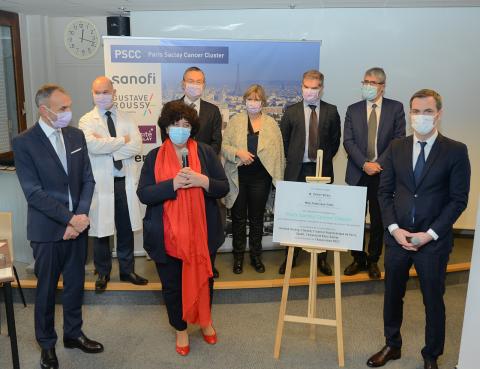
The Paris Saclay Cancer Cluster is officially launched
During a ceremony held on Friday 4 February 2022, World Cancer Day, at the Gustave Roussy Institute, the Paris Saclay Cancer Cluster (PSCC) was officially launched. Université Paris-Saclay is one of the project’s founding members, alongside Sanofi, Gustave Roussy, Inserm (the French National Institute of Health and Medical Research) and Institut Polytechnique de Paris.
The launch was attended by Olivier Véran, the French Minister for Solidarities and Health, Frédérique Vidal, the French Minister for Higher Education, Research and Innovation, and representatives of the cluster’s five founding members, including Sylvie Retailleau, President of Université Paris-Saclay.
During the event, the project’s official legal structure and its appointed leaders were announced. Eric Vivier, Professor at the Assistance Publique Hôpitaux de Marseille, Aix-Marseille University, was appointed Chairman of the PSCC association. A specialist in cancer immunology, he is also one of the founders of Innate Pharma, a clinical-stage biotech company specialising in immuno-oncology. In addition, Benjamin Garel, who has managed the Martinique University Hospital for the past three years, was appointed Managing Director.
Université Paris-Saclay is delighted to be a founding member of the Paris Saclay Cancer Cluster, which is line with our desire to meet the major challenges of our time with our industrial partners. With our Faculties of Medicine and Pharmacy, this shared ambition feeds into our programmes, research and innovation in oncology. Recognised internationally, the University’s high level of disciplinary expertise in this field is enhanced by our work in AI, data science, applied mathematics and engineering.
The Paris Saclay Cancer Cluster
Announced for the first time in June 2021 by French President Emmanuel Macron, the Paris Saclay Cancer Cluster (PSCC) aims to develop a unique ecosystem uniting key players in oncology research and innovation from both the public and private sectors: patients, hospitals, universities, start-ups, companies, investors, national research organisations and public authorities. The PSCC is set to develop innovative cancer treatments and improve the care provided to cancer patients, life expectancy and quality of life for people with cancer.
The cluster will be located in the south of Paris, close to Gustave Roussy, and will be a key driver in its local area. Its size and ambition make the project unique in Europe, and it will contribute to establishing France as a global leader in the transformation of science into reality for patients in the field of oncology.
The project’s four key pillars
- A collaborative and interdisciplinary approach, which gives its members the opportunity to progress in a unique environment where researchers, medical professionals, academics, entrepreneurs, manufacturers and investors come together. The PSCC association hopes to welcome 80 members in the coming year with an objective of 200 members by 2027.
- An ecosystem centred on excellence, making it possible to exchange with multidisciplinary experts, scientists and medical professionals, and access high-level training, courses and mentoring.
- Accelerating services and technologies thanks to a specialised technical platform which brings together a unique combination of research facilities, specialised support services to accelerate proofs of concept, and improved access to samples.
- Consolidated and enhanced specialised data, such as deep longitudinal data from several sources, storage and analysis infrastructure, expert support and acceleration via artificial intelligence.
